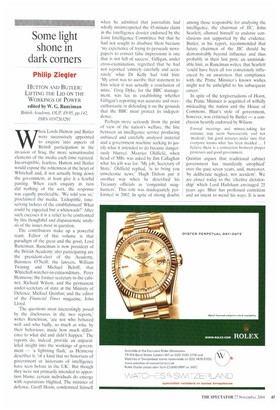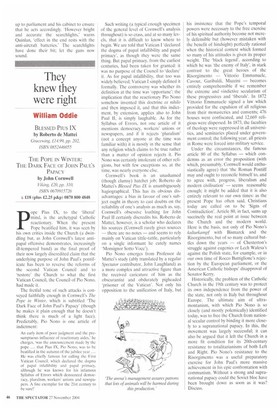Some light shone in dark corners
Philip Ziegler
HUTTON AND BUTLER: LIFTING THE LID ON THE WORKINGS OF POWER edited by W. G. Runciman British Academy, OUP, f9.95, pp.142, ISBN 0197263291 When Lords Hutton and Butler were successively appointed to enquire into aspects of British participation in the invasion of Iraq, the more sensationalist elements of the media each time rejoiced. Incorruptible, fearless, Hutton and Butler would expose the rottenness at the heart of Whitehall and, if not actually bring down the government, at least give it a fearful pasting. When each enquiry in turn did nothing of the sort, the response was equally predictable. 'We told you so,' proclaimed the media. 'Lickspittle, timeserving lackeys of the establishment! What could be expected but a whitewash?' After such excesses it is a relief to be confronted by this thoughtful and dispassionate analysis of the issues most in question.
The contributors make up a powerful team. Editor of this volume is that paradigm of the great and the good, Lord Runciman. Runciman is now president of the British Academy; also participating are the president-elect of the Academy, Baroness O'Neill; the lawyers, William Twining and Michael Beloff; that Whitehall-watcher-in-extraordinary, Peter Hennessy; the former secretary to the cabinet, Richard Wilson, and the permanent under-secretary of state at the Ministry of Defence, Michael Quinlan; and the editor of the Financial Times magazine, John Lloyd.
'The questions most interestingly posed by the disclosures in the two reports,' writes Runciman, 'are not who behaved well and who badly, so much as who, by their behaviour, made how much difference to what did and didn't happen.' The reports do, indeed, provide an unparalleled insight into the workings of government — 'a lightning flash,' as Hennessy describes it, 'of a kind that no historians of government or historians of intelligence have seen before in the UK'. But though they were not primarily intended to apportion blame, certain individuals do emerge with reputations blighted. The minister of defence, Geoff Hoon, condemned himself when he admitted that journalists had wholly misinterpreted the 45-minute claim in the intelligence dossier endorsed by the Joint Intelligence Committee but that he had not sought to disabuse them because 'my experience of trying to persuade newspapers to correct false impressions is one that is not full of success'. Gilligan, under cross-examination, regretted that he had not reported 'entirely carefully and accurately' what Dr Kelly had told him: 'My error was to ascribe that statement to him when it was actually a conclusion of mine.' Greg Dyke, for the BBC management, was lax in establishing whether Gilligan's reporting was accurate and overenthusiastic in defending it on the grounds that the BBC must protect its independence.
Perhaps more seriously from the point of view of the nation's welfare, the line between an intelligence service producing unbiased and carefully analysed material and a government machine seeking to justify what it intended to do became dangerously blurred. Maurice Oldfield, when head of MI6, was asked by Jim Callaghan what his job was for. 'My job, Secretary of State,' Oldfield replied, 'is to bring you unwelcome news.' Hugh Dalton put it another way when he described his Treasury officials as 'congenital snaghunters'. This role was inadequately performed in 2002. In spite of strong doubts among those responsible for analysing the intelligence, the chairman of JIC, John Scarlett, allowed himself to endorse conclusions not supported by the evidence. Butler, in his report, recommended that future chairmen of the JIC should be demonstrably beyond influence and thus probably in their last post; an unmistakable hint, as Runciman writes, that Scarlett 'could have been all too consciously influenced by an awareness that compliance with the Prime Minister's known wishes might not be unhelpful to his subsequent career.'
In spite of the tergiversations of Hoon, the Prime Minister is acquitted of wilfully misleading the nation and the House of Commons. Blair's style of government, however, was criticised by Butler — a conclusion heartily endorsed by Wilson:
Formal meetings and minute-taking for instance may seem bureaucratic and not 'modern'; but good minutes make sure that everyone knows what has been decided ... I believe there is a connection between proper processes and good government.
Quinlan argues that traditional cabinet government has 'manifestly atrophied' over the past seven years, and, moreover, 'by deliberate neglect, not accident'. We are closer today to the 'elective dictatorship' which Lord Hailsham envisaged 25 years ago. Blair has professed contrition and an intent to mend his ways. It is now up to parliament and his cabinet to ensure that he acts accordingly. 'However bright and accurate the searchlights,' warns Quinlan, 'effect in the end rests with the anti-aircraft batteries.' The searchlights have done their bit; let the guns now sound.



















































































 Previous page
Previous page